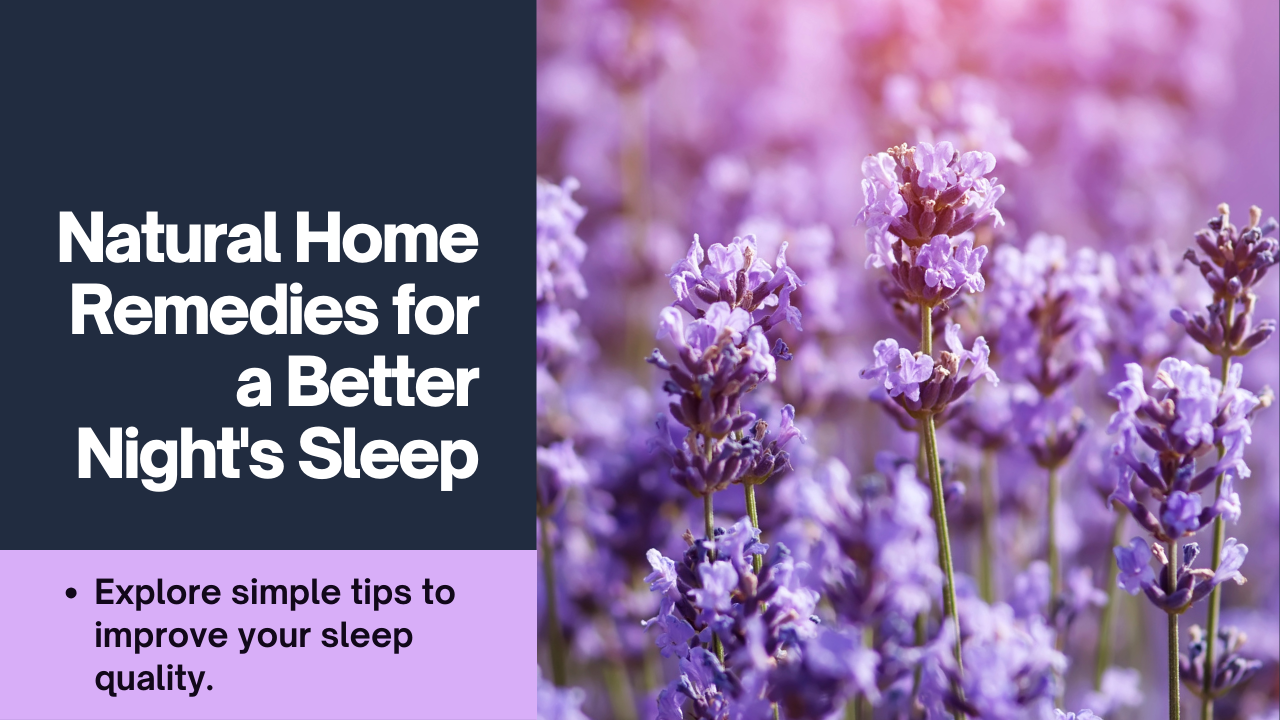Getting a good night’s sleep is essential for overall health and well-being. Poor sleep can affect your mood, energy levels, and even your immune system. Fortunately, there are many effective home remedies to improve your sleep quality. These remedies are easy to implement and can make a significant difference in your nightly rest.
1. Establish a Consistent Sleep Schedule
One of the most effective ways to improve your sleep is by establishing a consistent sleep schedule. Going to bed and waking up at the same time every day helps regulate your internal clock. This consistency can make it easier to fall asleep and wake up feeling refreshed. Try to stick to your schedule even on weekends to maintain a steady routine.
2. Create a Relaxing Bedtime Routine
A relaxing bedtime routine can signal to your body that it’s time to wind down. Activities such as reading a book, taking a warm bath, or practicing gentle yoga can help you relax. Avoid stimulating activities like watching TV or using electronic devices, as the blue light emitted can interfere with your ability to fall asleep.
3. Limit Exposure to Blue Light
Speaking of blue light, limiting your exposure to it in the evening can significantly improve your sleep. Blue light from phones, tablets, and computers can disrupt your circadian rhythm. Try using blue light filters on your devices or switching to night mode. Alternatively, avoid screens altogether at least an hour before bedtime.
4. Keep Your Bedroom Cool
The temperature of your bedroom can greatly affect your sleep quality. Most people sleep best in a cool room, around 60-67 degrees Fahrenheit (15-19 degrees Celsius). Keep your bedroom well-ventilated and use breathable bedding to stay comfortable throughout the night.
5. Reduce Caffeine and Alcohol Intake
Caffeine and alcohol can both interfere with your sleep. Caffeine, found in coffee, tea, and many sodas, is a stimulant that can keep you awake. Try to avoid consuming caffeine in the late afternoon and evening. Alcohol, while it may help you fall asleep initially, can disrupt your sleep cycle later in the night. Limit your alcohol intake, especially close to bedtime.
6. Herbal Teas for Relaxation
Certain herbal teas can promote relaxation and better sleep. Chamomile tea, for instance, has calming properties that can help you unwind. Other effective options include valerian root tea, lavender tea, and lemon balm tea. Enjoy a cup of one of these teas about an hour before bedtime to help you relax and prepare for sleep.
7. Aromatherapy with Essential Oils
Aromatherapy is another effective home remedy for better sleep. Essential oils such as lavender, chamomile, and bergamot are known for their calming effects. You can use an essential oil diffuser in your bedroom or apply a few drops of oil to your pillow or a cotton ball near your bed. The soothing scents can help you relax and drift off to sleep.
8. Practice Mindfulness and Meditation
Mindfulness and meditation practices can help calm your mind and prepare your body for sleep. Simple techniques like deep breathing, progressive muscle relaxation, or guided meditation can reduce stress and anxiety. Spend a few minutes each night practicing these techniques to improve your sleep quality.
9. Exercise Regularly
Regular physical activity can promote better sleep. Exercise helps reduce stress and fatigue, making it easier to fall asleep and stay asleep. Aim for at least 30 minutes of moderate exercise most days of the week. However, try to avoid vigorous exercise close to bedtime, as it can be stimulating and interfere with your ability to fall asleep.
10. Limit Naps
While napping can be beneficial, long or irregular naps during the day can negatively affect your nighttime sleep. If you need to nap, try to keep it short, around 20-30 minutes, and avoid napping late in the afternoon. This can help ensure that you’re tired enough to fall asleep at your regular bedtime.
11. Optimize Your Sleep Environment
Creating an optimal sleep environment is crucial for better sleep. Ensure your bedroom is dark, quiet, and comfortable. Consider using blackout curtains to block out light and earplugs or a white noise machine to drown out any disruptive noises. A comfortable mattress and pillows are also essential for a good night’s sleep.
12. Try Natural Supplements
Certain natural supplements can promote relaxation and improve sleep quality. Melatonin, for instance, is a hormone that regulates sleep-wake cycles and can be taken as a supplement to help you fall asleep. Other supplements like magnesium, valerian root, and L-theanine have also been shown to aid sleep. Always consult with a healthcare provider before starting any new supplement.
By incorporating these 12 effective home remedies into your nightly routine, you can improve your sleep quality and wake up feeling refreshed and energized. Remember, consistency is key. Stick with these remedies, and you’ll be on your way to better sleep in no time.
For more tips on living a healthier life, check out our YouTube video on 12 Effective Home Remedies for Better Sleep. Join our community on Facebook Group and Discord Server, and follow us on our Facebook Page.




